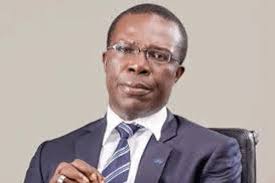
South-East private sector kick-starts regional development strategy
Some prominent members of the business sector from the South East have taken the initiative in light of the administrations' apparent incapacity to articulate and propel economic growth for the region despite insecurity.
They decided to construct a roadmap for the region's economic development that would address security and governance issues and promote private-sector-led initiatives, using the discussion on the fourth quarter economic outlook for the region as a platform.
They also talked about the creation of an Eastern Economic Summit to offer a targeted forum for regional development and advocacy, as well as how to exploit the diaspora of the region's residents, both domestic and foreign, to attract investment.
Present at the meeting includes President/ CEO of Coscharis Group, Dr. Cosmas Maduka, Managing Director/ CEO of Cowry Assets Management Ltd, Mr Johnson Chukwu, CEO of Impact Investors Foundation, Etemore Glover, Director, Lagos Business School, Prof. Franklin Ngwu, amongst many other private sector leaders and entrepreneurs.
Opening the discussions on the regional initiative, Ngwu who moderated the session, hinted of the massive development needs of the region despite huge human capital and material resources available but untapped.
He also indicated that the session was anchored on building the consciousness and resolving to take actions towards realizing the potentials. He said the private sector initiative has become imperative at this time when it appears that the governments at all levels especially in the region appear to be battling with too many distractions from the task at hand.
It’s time to invest in homeland —Chukwu
Leading the discussions, Mr Chukwu gave some details of the region’s potentials while also hinting on the need for the entrepreneurs and other citizens of South East to initiate investment actions to tap the potentials and develop the zone.
He likened the circumstance of the South East to that of Jews in dispersal and scattered all over the world but were forced by existential threats in foreign lands to seek for a homeland and collectively they re-established their nation in their fatherland.
According to him “the Jews decided to go back to the place they call Israel together, and they decided to invest whatever they had in the homeland. And by going back to invest, they have gone ahead and established one of the world’s most progressive country”.
He said he has already started investing in building a business in the downstream sector of the oil and gas industry in several cities in the South East despite the security challenges. He stated: “I know the challenges in the South-east, and I know we have insecurity, but we won’t die here. That’s a fact”.
He said the private sector should lead the charge in asserting the capacity to transform the zone despite the security situation, adding that the same security challenge pervades the entire country.
"Insecurity in the southeast region of the country is driven by three factors," he said. Political marginalisation is the first; economic hardship and problems are the second; and the overall failure of the nation's governance is the third.
He offered the following suggestions for remedies: "By generating jobs, we could lessen the causes of insecurity in the South East. Those who work for the companies and investments will not join IPOB or unidentified armed groups.
Therefore, if everyone with the ability to make money can go and start firms, the investments will have a favourable effect.
"In actuality, investments can have an impact on the social structure to lower poverty levels, enhance the environment, and increase economic growth and improve living standards.
“Assuming many of us try to create investments, businesses in the zone we are going to take away from the number of people who are currently in crime and insecurity, be it IPOB or whatever. I’m not saying the agitation is not right. I’m just saying the violent part of it can be moderated.
“So we need to create more goods and services. We need to create more jobs. And then we will be able to recruit all the people who are currently in the bush into normal economic activities.
“I think that’s where private sector leaders come in, and when we continue that way, we are going to propel public sector responsibilities and investments in the zone”.
There’s need for South East Economic Summit — Coscharis
Dr. Maduka, President of Coscharis Group, who arrived at the venue of the meeting on Okada (motorcycle) to beat the traffic, said he greatly believe in the need for South East Economic Summit to create an integrated regional agenda and strategy to be properly articulated and pursued by all stakeholders.
Reacting to the presentations of the zone’s economic potentials by Johnson Chukwu, Maduka stated: “To create and host eastern economic summit where this kind of picture will be presented is now very imperative, because a lot of us are not well informed about the potentials that is in the zone.
“With more information on the potentials and capacity of the zone presented to all stakeholders in the Economic Summit, the people will understand that Rwanda, as a country, is less endowed in natural and human resources compared to the South East, but they are doing far better than us.
“Why can’t we create it; why can’t we make it happen in our land? We have everything that we require to be a great people.
“But, politically, I think we are somehow sabotaged. And then, the next thing is that the people in leadership, some of them are completely oblivious of this fact. They haven’t seen it, or they haven’t believed in it, or personal interests have become what is more important to them.
“If they would appreciate all of these economic endowments within their domain, it’s not going to be a magic in transforming South East into the most prosperous in Africa, but it will be a one economic miracle in the continent, that is the growth we will see in the South-East, if we get all other things that we require to be great right”.
When asked if he has been advising the political leaders in the South East, Maduka stated: “I always do, I make suggestions but the truth is that anything you cannot control, you cannot fix. Also on the part of our political leaders, I will say, if you cannot conceptualise any problem, you cannot provide a solution to it.
“When you have leadership that is so detached from reality of life that is what you get. You tell them there’s no bread for the people, and they say why don’t you give them cake? The assumption is that the people have choice between cake and bread but they don’t understand there’s no food.
"So, how do you persuade someone in that leadership position to offer solutions? He is completely disconnected from today's world. Although it's difficult, I myself have a lot of hope that things will change in due time.
Having stated all of that, the next step is to identify the appropriate leadership that will establish the enabler in the current situation. There is no face to investment capital. It travels wherever it perceives a suitable setting. Put on your best clothes if you're trying to raise money. Additionally, opportunities will arise if you present yourself well.
The mobilisation of investments from the diaspora, or South-easterners living outside of Nigeria, was another topic Dr. Maduka covered, saying : saying: “Today, diaspora people are not those ones that used to come home from abroad and we support them with some money to go back. “Today they have dollar power. The beautiful houses we are seeing today in our villages are built by them.
“But that is our trait, because there is this thing about us that we believe in our home place. We never go out and forget about home”.
According to him, “we have emotional attachment whether you like it or not. It’s not just about profit. There is what we call social enterprises. It could be just to provide a job, you remember that this is where gave birth to you; We don’t just cross and forget home completely.
“So, most of our people still have that intention. What has happened is that because of this seaport and different environmental challenges, we are by nature staying where we earn wealth; We look for frontiers; We are capitalists, we go to look for opportunities. So we have weakened the people at home”.
We should get in diasporas’ capital —Glover
Speaking on the opportunities for attracting investments to South East, Etemore Glover, CEO of Impact Investors Foundation, stated: “It calls us to start thinking differently. How do we take advantage of the diaspora community, both diasporas that are within Nigeria and diasporas of the Eastern region that are outside the country, to deploy capital to the Eastern region? And how do we increase government participation to provide environment for de-risking capital or other forms of catalytic capital that can unlock private sector investment into that region? It’s a whole lot of things. We need to think differently. We need to think innovatively.
“We need capital that can take more risk, because at the end of the day, capital will not go where there will be no maximum return”.
Reflecting on the potentials of the region as presented by Chukwu, she stated: “What kind of conversation can we have to see such fantastic presentation to still get so





